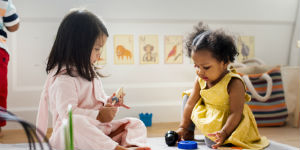My passion for being environmentally responsible started in childhood with watching how my father treated nature,” says Lorisa Zazular.
Today, Lorisa is developing a ‘green’ pilot project for Acadia Daycare at its University of British Columbia (UBC) centre.
She says, “It’s really important to ensure that children have an awareness of, and respect for, what surrounds them.”
The project started when Lorisa became supervisor about three years ago. She put the daycare and her three- to
five-year-old charges on a new path.
“We teach the children respect, kindness and empathy of themselves, each other, their environment and the materials around them,” she says.
The first lesson was the type of toys that were purchased. They gradually replaced plastic with natural materials. Today, most of their toys are wood, glass or made of
natural fabrics such as silk and wool.
The second lesson was repairing what is broken.
“The kids see that we don’t need to be a disposable society. The kids used to say ‘Just throw it out’. Now they not only
say, ‘Fix it,’ they like to help repair toys themselves.”
The third lesson was supporting the local community when making purchasing decisions so that products are not being shipped long distances.
The fourth lesson was moving to organic, locally grown foods. The centre plans to start its own garden next year, so the children can close the link on where their food comes from.
The kids compost when they finish their lunch. “They know which bits go in the compost, which containers get recycled and what goes in the garbage,” says Lorisa.
The compost goes to UBC waste management, which is returned to the daycare in the form of dirt to be used in its gardens.
ACROSS THE COUNTRY
The Huron Tower Childcare Centre in Ottawa will relocate to a Leadership in Energy and Environmental Design (LEED) certified facility in 2010.
Features state-of-the-art, deep green building:
- no carpeting
- radiant heated floors
- large, energy-efficient windows
- low VOC-emitting surface compounds
- playground set in a natural setting
Traditional play structures will be replaced by paths, plants, shade trees and a tricycle path. Beyond the fenced playground, the children will be able to explore a butterfly and sunflower meadow.
The daily program will include:
- outdoor organic gardening
- using cisterns to capture rain water for the flower gardens
- snacks that feature fresh as opposed to canned fruits and vegetables
These changes represent a beginning in teaching children concepts and habits that will become normal behaviour for them.










